To The Rockefeller Foundation Team, Partners, and Friends:
This past March, I rode deep into India’s countryside to the deserts of Little Rann of Kutch. I was traveling to meet a Foundation grantee, the Self Employed Women’s Association (SEWA), that I wrote to you about last year. I spent much of the day—amid deep, penetrating heat—talking with SEWA members about their lives and work. Some of them showed me how they pull long-poled rakes along the salt flats to harvest that life-giving substance and a living.
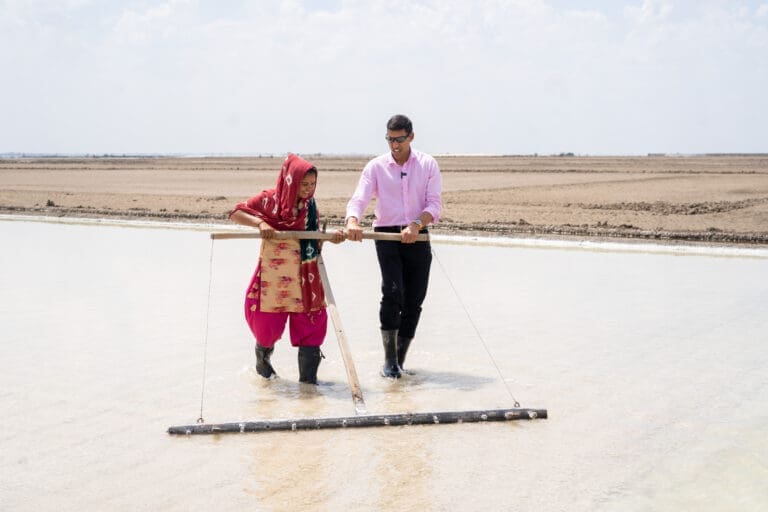
My visit was a reminder of how the Foundation’s work evolves. Over the last decade, we have worked with SEWA, India’s largest union of informal sector workers, to confront new threats and opportunities, responding to a housing crisis, improving agricultural analytics, and more. Now we are helping workers recover wages lost to increasingly extreme heatwaves. As a result, the trip also confirmed the realization I wrote about last year: we cannot meet The Rockefeller Foundation’s 110-year-old mission to promote the well-being of humanity throughout the world without addressing the climate crisis.
Climate change—its scale and potential harm—is unlike any challenge the Foundation or humanity have faced over the past century. The crisis threatens people around the world and progress itself.
For the first time in my career, we face a future where the headwinds to human development grow stronger by the day—and where everyone could become less well off, secure, and free.
Over the last year, we have sought to further understand the impact of the climate crisis on our work and the people we serve. This review took us around the world virtually and physically as our teams spoke to those suffering on the climate crisis’ frontlines and working to curb its worst effects. We also undertook a comprehensive review of our enterprise from how we invest to what we spend, and from what has worked to when we have made missteps.
We came away from this review with several conclusions, including:
The world is heating up faster than anyone expected—and it is starting to cross tipping points that will change our daily existence. The next five years are predicted to be even hotter, likely surpassing 1.5°C above than the pre-industrial average. This warming’s effects will shorten and worsen the lives and livelihoods of the world’s most vulnerable people, who have contributed the least to it. We have seen this most recently in the fire-ravaged town of Lahaina, Maui, flooding in Pakistan, Italy, and elsewhere, and a severe drought in the Horn of Africa.
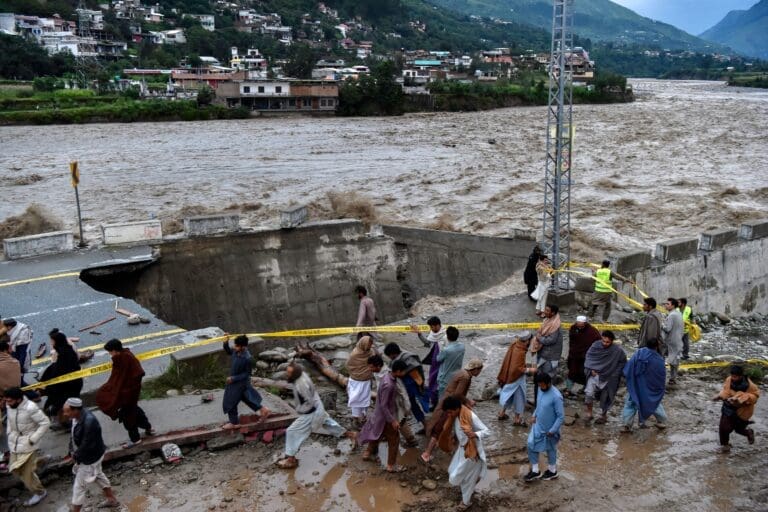
The root cause of global warming is the fossil-fueled economic system that prevails nearly everywhere. Carbon-based electricity and agriculture—two of the sectors that the Foundation has historically worked in—are responsible for nearly 50 percent of global greenhouse gas emissions. The crisis is also creating new challenges for public health and finance systems.
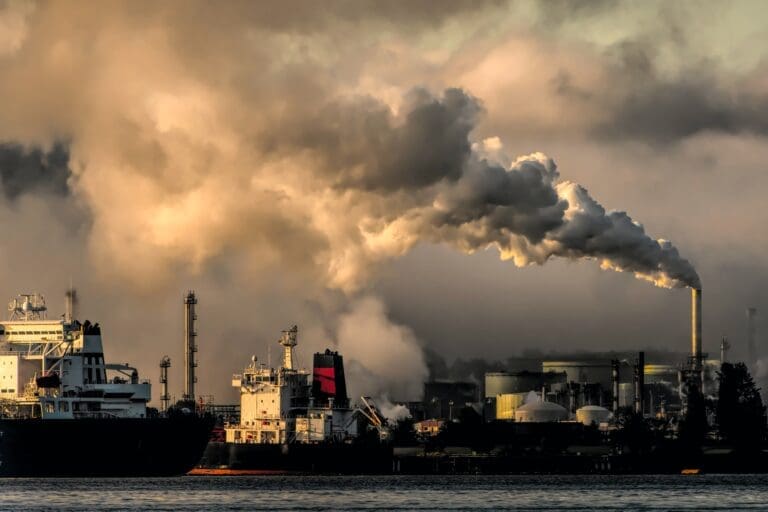
Current efforts to help people mitigate and adapt to climate change are insufficient. People’s interests reside at the nexus of both mitigation and adaptation, but current spending and action aims at one or the other. The best climate solutions will serve both.
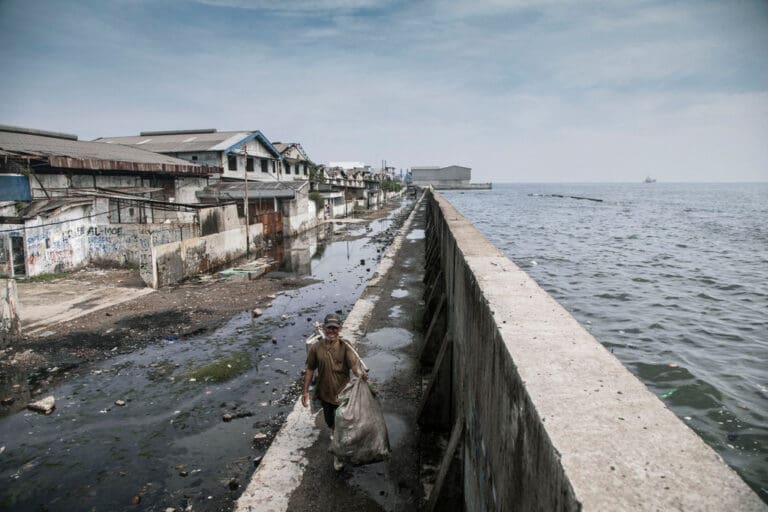
While these findings are dire, our review made clear that humanity can meet this moment. Right now, climate transformations are underway that prove that the resolve and resources, the innovations and ideas exist to slow the climate crisis and speed progress for people. But these transformations are incomplete and inequitable—they are underway in wealthier countries and communities, while special interests and structural barriers keep everyone else from joining in.
We believe humanity can and must do better. People are programmed for progress: they will take steps, regardless of the climate impact, to unlock opportunity for themselves, their loved ones, and their neighbors. As a result, failure to expand these transformations will lead to climate catastrophe. But by accelerating these climate transformations, we can help everyone advance their own lives while reversing the climate crisis.
Here, I would like to walk through what we believe needs to change, how the Foundation can contribute, and why we must work together to continue to promote the well-being of the women of SEWA and everyone else.
What Must Change
Moving forward, we will leverage every part of our Foundation—including our resources, convenings, and voice—to help transform the four systems that are essential to the well-being of people and the planet: energy, agriculture, health, and finance.
For example, energy system transformation is happening right now, due in part to the investments of the Foundation and its partners. Nearly 15 years ago, our teams began working to address one of the world’s great injustices: helping empower the 3.6 billion people who lack sufficient access to affordable, reliable electricity. Through trial and error, our partners in India developed a solar mini-grid that could provide reliable power at a competitive price, all with little to no carbon emissions. The promise of this transformation had been made real: thousands of people could advance their lives and their livelihoods without accelerating the climate crisis.
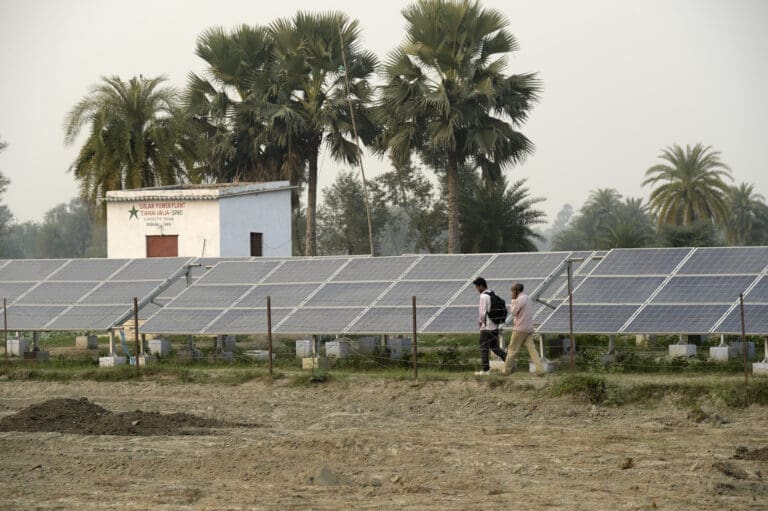
In the years since, the Foundation has worked with partners to scale this solution to thousands of villages. Then, in the depths of Covid-19, we made a big bet to help the energy poor not just recover from the pandemic’s economic impacts but compete in the modern economy for the first time, all while displacing fossil fuel generation. The result was the Global Energy Alliance for People and Planet, which was established with the IKEA Foundation, the Bezos Earth Fund, and other partners. The Alliance is now at work in twenty countries. Meanwhile, in Zambia, The Rockefeller Foundation and partners are planning to roll out 100 mini-grids, of what we expect will eventually become a thousand over the next five years, which can empower one million people and businesses.
The world needs to deepen and broaden that energy work while accelerating similar transformations in the food, health, and finance systems. More specifically:
Without major acceleration of clean energy deployment by 2050, 75 percent of global emissions could come from the 81 low- and middle-income countries considered energy-poor. The 3.6 billion people who currently live in energy poverty—almost 800 million of whom are still completely in the dark—deserve access to sufficient and reliable power. But doing so without triggering a climate catastrophe will require a transformation of the global energy system so that it provides clean energy for everyone.
Our food system fails to adequately nourish over three billion people, even as it accelerates climate change by producing a quarter of emissions worldwide. We need a global transformation that ensures the system produces food that is good for people and the planet.
While the health sector accounts for only 4 percent of the world’s emissions, 3.3 billion people who are least responsible for total emissions are bearing the greatest health impacts from climate change. We need a transformation of health systems to better prevent, predict, detect, and respond to disease outbreaks caused or worsened by climate change.
Climate change is exacerbating existing inequities throughout the global financial system. Though trillions of dollars are being invested in energy transitions in wealthier nations and localities, $3.2 trillion more is needed each year, particularly in communities being battered by climate change. We need a global financial system transformation that both unlocks that level of finance and channels it toward those who need it the most.
- 0%
of global emissions could come from the 81 low- and middle-income countries considered energy-poor
- 0billion
people still live in energy poverty currently
- 0million
of whom are still completely left in the dark
- 0billion
people our food system fails to adequately nourish
- 0billion
people who are least responsible for these emissions are bearing the greatest health impacts from climate change
- $0trillion
more needed each year to bridge the funding gap
People and communities around the world are demanding to participate in these transformations. To meet that demand, each transition must have a few measurable characteristics:
- These systems should eventually become climate-neutral or -positive.
- Each transformation must be focused on equity, reaching as many as necessary—in most cases billions and billions of people.
- The transition has to further opportunity: for example, the energy transformation needs to ensure everyone can meet what is called the “modern energy minimum,” or 1,000 kilowatt hours of consumption per capita, per year. This level of reliable electricity would allow people to not just run a small appliance but also operate a small business.
- These transformations must attract investment. Scale is only possible with resources and commitments from governments, the private sector, and communities themselves.
What Rockefeller Can Contribute
To see how the Foundation can contribute to these transformations, we looked at our history. As was made clear by our 2020 to 2022 impact report, the Foundation is most effective when we dedicate our grantmaking, operations, voice, endowment, and convenings to specific outcomes in areas where we have unique expertise and strong networks.
We do not have all the answers on the climate crisis, but we know that inclusive transformations are possible and that we can help accelerate them.
Over the next five years, the Foundation will invest more than $1 billion and dedicate our whole enterprise to help bring the world together to address climate change in a more concerted, effective manner and, ultimately, make opportunity universal and sustainable.
This strategy will require us to work in new ways, including:
We will help identify and scale the most promising climate solutions,
whether it is a new type of battery storage system, a new use for an established idea like wastewater surveillance and regenerative farming, or the adoption of new risk assessments by multilateral development banks to allow more lending. These solutions may not exist yet or still need to develop, but when they look promising, we will make “big bets”: concerted efforts to solve one problem by scaling resources and know-how behind innovations, building alliances for true scale, and tracking our progress until we succeed.
We will catalyze actions with our convenings and our voice.
We will bring together unlikely partners to solve problems. We will use our voice to share new ideas and build support for these transformations. We will work with these partners to turn new ideas into new policies—and ensure other communities and even countries can replicate them. And we will work with investors to find new markets and shift old ones.
We will operate and invest in new ways to augment these transformations.
We are committed to ensuring our operations meet a science-based Net Zero target.
And we will support big bettors.
Throughout our history, we have hosted and supported world leaders, young scholars, senior scientists, unknown artists, and many others who have used their time with us to do the work and thinking required to advance ideas and innovations. We are now building a network of those eager to make large-scale climate change.
Well-Being
John D. Rockefeller established a philanthropy focused on using the latest science and technology to solve the root causes of humanity’s most vexing problems. Today, our mission requires confronting another of his legacies. We hope that a big oil fortune can support the sorts of big climate actions needed.
We know these new initiatives, and others we will announce in the months and years ahead, will not be sufficient to end the climate crisis. It is a multi-trillion-dollar problem—no one institution has any hope of solving the climate crisis, or even any one piece of it, alone. Instead, we make this investment confident that our ultimate impact will depend not on how much we spend over the next five years, but on how we spend it—and how we work with others.
We are excited to partner with individuals and institutions of all kinds. If you are eager to work together to advance these transformations, you can reach us here. And if you are someone who wants to make big bets of your own, you can sign up here to find out more.
Thank you. We look forward to working together to promote humanity’s well-being, advancing opportunity even as we reverse the climate crisis.
Onwards,

Dr. Rajiv J. Shah
President, The Rockefeller Foundation